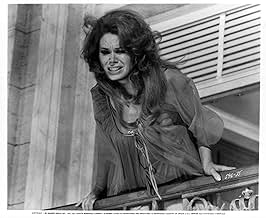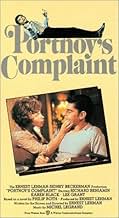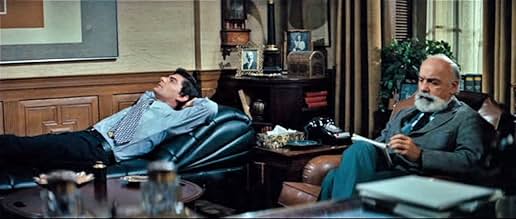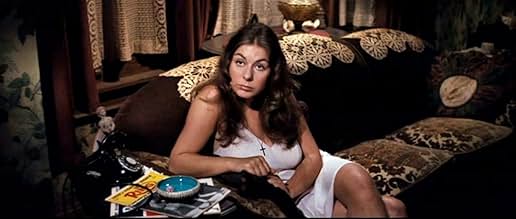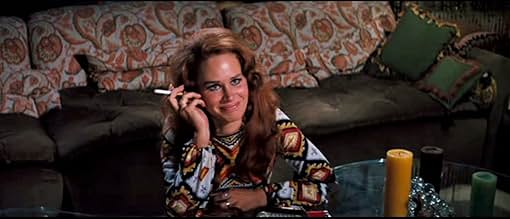The movie chronicles a young man's (Richard Benjamin) love and passion in his own kinky way.The movie chronicles a young man's (Richard Benjamin) love and passion in his own kinky way.The movie chronicles a young man's (Richard Benjamin) love and passion in his own kinky way.
Renée Lippin
- Hannah Portnoy
- (as Renee Lippin)
Lewis J. Stadlen
- Mandel
- (as Lewis Stadlen)
Francesca De Sapio
- Lina, Whore in Rome
- (as Francesca DeSapio)
D.P. Barnes
- Dr. Spielvogel
- (as D. P. Barnes)
Arline Bletcher
- Elevator Lady #2
- (uncredited)
John Carradine
- Judge
- (voice)
- (uncredited)
Mike De Anda
- Mr. Harero
- (uncredited)
- Director
- Writers
- All cast & crew
- Production, box office & more at IMDbPro
Featured reviews
Whoa! I've heard of some screwed up people, but Alexander Portnoy (Richard Benjamin) belongs in a class on his own. Through a session with his psychiatrist, he tells the story of how his overbearing mother (Lee Grant) kept a little bit too tight a rein on his sexuality during his formative years, and he ended up with a mangled view of relationships. He dates a number of women, but none of them work out. As Alexander says at one point: "I'm living my life as a Jewish joke."
The sad part is, much what happens in "Portnoy's Complaint" probably really happened. Philip Roth's two most famous novels (the other one was "Goodbye, Columbus") both dealt with Jewish neurosis. Alexander's mother is truly the sort of mother whom no one wants to have (she takes a certain bizarre interest in the results of people's bodily functions). Some people may wonder why they made this into a movie, but it definitely shows a side of life that we too often forget about. And anyway, regardless of one's opinion of it, "Portnoy's Complaint" is a much more justifiable movie than "Independence Day" or Bio-Dome".
The sad part is, much what happens in "Portnoy's Complaint" probably really happened. Philip Roth's two most famous novels (the other one was "Goodbye, Columbus") both dealt with Jewish neurosis. Alexander's mother is truly the sort of mother whom no one wants to have (she takes a certain bizarre interest in the results of people's bodily functions). Some people may wonder why they made this into a movie, but it definitely shows a side of life that we too often forget about. And anyway, regardless of one's opinion of it, "Portnoy's Complaint" is a much more justifiable movie than "Independence Day" or Bio-Dome".
Constipation and diarrhea is presented as a running theme in this movie which serves to define this movie in it's entirety. Something to pass on as flushable down the toilet. What we get subjected to are the trials and tribulations of its male star attraction who heroically goes through life tasked with gratifying his sexual lust. Which for him is a daily routine as necessary for life as three meals a day. Amazing it is that the people who put this production together were able to assemble reputable actors willing to become cast members in this fiasco. Do yourself a favor and pass this one up.
Richard Benjamin, Karen Black, Lee Grant, Jill Clayburgh, what were you thinking?
Richard Benjamin, Karen Black, Lee Grant, Jill Clayburgh, what were you thinking?
I usually dislike movies based on famous novels. This one is funny, bold and deep, yet the critics think it's trash. My criticism of the movie is that it didn't go far enough. Richard Benjamin is terribly miscast. He is far too handsome, patrician and cool. He belongs in a country club, hunting foxes. They should have picked a homelier, less serene type. The action should have been less restrained and "tasteful". They should have laid it on thick, used more camp. At times the film looked like a Ross Hunter production!!! It was too nice and smooth. But despite these major insufficiencies, it is one of the better films ever made. I must read the novel. But how can I do that, given my vow never to read fiction again?
This film feels like the smarmy ramblings of an emotional 8-year-old, replete with indulgent fantasies a la Walter Mitty. The action revolves around its main character's (Richard Benjamin) perpetual, neurotic obsession with all bodily fluids and his dysfunctional family.
Richard Benjamin is perfectly cast as Portnoy, an uninteresting bundle of neuroses.
Overall, the film has as much charm as an episode of "Love American Style" written and directed by a foul-mouthed boy with a dictionary of vulgar words at his elbow. I can't imagine that anyone associated with this film was forever proud of his/her part in it.
Richard Benjamin is perfectly cast as Portnoy, an uninteresting bundle of neuroses.
Overall, the film has as much charm as an episode of "Love American Style" written and directed by a foul-mouthed boy with a dictionary of vulgar words at his elbow. I can't imagine that anyone associated with this film was forever proud of his/her part in it.
Philip Roth's celebrated bestseller, a frank and overtly-rude novel of modern-day Jewish guilt and rage, comes to the screen somewhat neutered. Richard Benjamin plays the 33-year-old lawyer looking back on his boyhood in New Jersey, set in a stifling family house of Jewish repression, and later on his tumultuous affair with a shiksa fashion model. The themes of the book--the all-important mother figure (whose judge-and-jury persona shapes Portnoy's sex life) and the wanton craving for constant ejaculation--are touched upon here fleetingly; but Ernest Lehman, who adapted the script and directed, is too tasteful for raunch. He seems to have decided that simply satirizing Jewish conventions (in a familiar, cartoony way) would suffice instead. And so we get the standard arguments around the kitchen table, the squabbling about kosher diets, the meddling and prodding over sexual matters, and the inevitable battle between Jewish girls versus shiksas. This is all familiar territory by now, made even worse with the casting of Benjamin (didn't we cover much of this material with Benjamin in "Goodbye, Columbus"?). Karen Black gives the film's strongest performance as Portnoy's first serious girlfriend--she's flirty, sexy and scary all at once--but there's perhaps too much of her. The entire midsection of the movie is devoted to Portnoy's putting up with her moods, and Black's "Monkey" is haphazardly written (she's a child-like waif who can't spell in one scene, and a bilingual, bisexual woman of the world in the next!). However, Black's serious stab at this screenplay is commendable, and she gets some good speeches when she isn't being derogatory (the script being an equal-opportunity insulter). Lee Grant tries, too, to make something of the thinly-conceived role of Mother Portnoy, though Jack Somack as her husband is much better suited to the scenario and upstages her. Jill Clayburgh turns up in a throwaway role (she fights against being humiliated, but doesn't appear to teach Portnoy anything in the process). With all this talent on-board, one might be inclined to give the picture a break (it was savaged by the critics in 1972); alas, it is a film that doesn't come close to accomplishing what it sets out to be: a comedic film about sexual frustration, release and resolve. There are too many outré attempts at jokes without understanding the true root of the humor. ** from ****
Did you know
- TriviaErnest Lehman's first and last attempt to direct.
- Quotes
The Monkey: Is this your idea of a love affair, where you treat a woman as a leper?
- ConnectionsFeatured in Film Extra: Richard Benjamin (1973)
- How long is Portnoy's Complaint?Powered by Alexa
Details
Box office
- Gross US & Canada
- $614,416
- Runtime
- 1h 41m(101 min)
- Sound mix
- Aspect ratio
- 2.35 : 1
Contribute to this page
Suggest an edit or add missing content

